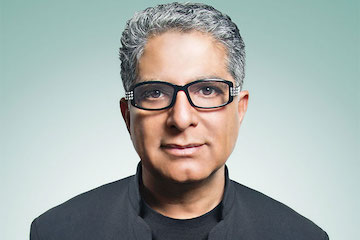
Deepak Chopra. An Indian American author, alternative medicine advocate, and prominent figure in the New Age movement. Born in New Delhi, India, Chopra earned his medical degree from the All India Institute of Medical Sciences in 1969 before emigrating to the United States, where he specialized in endocrinology and served as chief of staff at New England Memorial Hospital. Luce Index™ rank 90.
His career pivoted in the 1980s after embracing Transcendental Meditation and Ayurveda, leading him to co-found the Chopra Center for Wellbeing and author over 95 books, including bestsellers like Quantum Healing (1989) and The Seven Spiritual Laws of Success (1994).
Chopra’s teachings blend Vedantic philosophy, quantum mechanics, and mind-body medicine, though his claims of “quantum healing” and “ageless body” theories have drawn significant criticism from the scientific community, which labels them as pseudoscience.
Early Life and Medical Career
Deepak Chopra was raised in a family of medical professionals; his father, Krishan Chopra, was a distinguished cardiologist and British Army doctor.
After completing residencies in internal medicine at Boston-area hospitals, Chopra taught at Harvard Medical School, Tufts University, and Boston University while maintaining a clinical practice. His early interest in neuroendocrinology sought to link biological processes with emotional and mental states, foreshadowing his later focus on holistic health.
Transition to Alternative Medicine
In 1985, Chopra met Maharishi Mahesh Yogi, founder of the Transcendental Meditation (TM) movement, which catalyzed his shift toward Ayurvedic medicine. He established the Maharishi Ayurveda Health Center, offering high-priced wellness retreats that attracted celebrities like Elizabeth Taylor.
By the 1990s, Chopra distanced himself from TM, citing a “cultish atmosphere,” and relocated to California to lead Sharp HealthCare’s Center for Mind-Body Medicine. His 1993 appearance on The Oprah Winfrey Show propelled him to mainstream fame, solidifying his reputation as a spiritual guru.
Philosophy and Controversies
Chopra’s core philosophy posits that consciousness underpins reality, advocating practices like meditation, yoga, and dietary changes to achieve “perfect health”—a state he claims eliminates aging and disease.
Critics, including Richard Dawkins and Robert Carroll, argue that his misuse of quantum physics terminology constitutes “technobabble” lacking empirical basis. Despite skepticism, Chopra’s integration of Eastern spirituality with “Western science” has influenced millions, earning him recognition as one of TIME magazine’s “Top 100 Most Influential People.”
Legacy and Cultural Impact
Beyond his wellness empire, Chopra co-founded DeepakChopra.ai, an AI-driven well-being platform, and the Chopra Foundation, which funds research on mind-body medicine and supports underserved communities.
His 2024 book Digital Dharma explores the synergy between artificial intelligence and spiritual growth, reflecting his adaptive approach to modern challenges. Married to Rita Chopra since 1970, he maintains a disciplined lifestyle, rising at 4 a.m. for meditation and yoga.
#MindBodyMedicine, #Consciousness, #Spirituality, #QuantumHealing, #Meditation, #HolisticHealth, #AlternativeMedicine, #NewAge